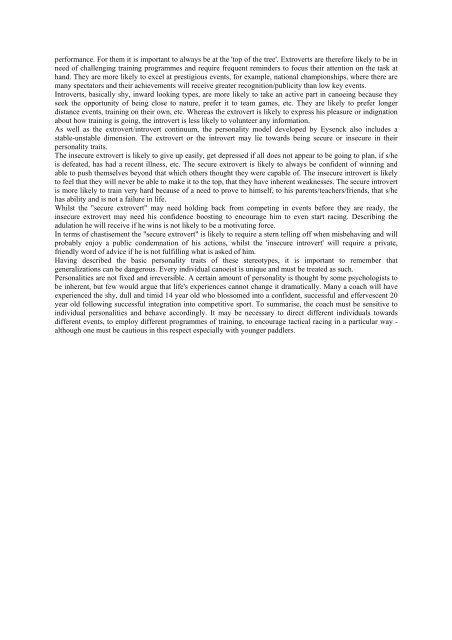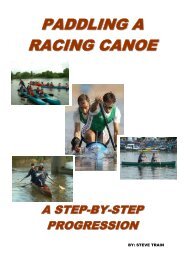The Science of Canoeing By Richard Cox
The Science of Canoeing By Richard Cox
The Science of Canoeing By Richard Cox
You also want an ePaper? Increase the reach of your titles
YUMPU automatically turns print PDFs into web optimized ePapers that Google loves.
performance. For them it is important to always be at the 'top <strong>of</strong> the tree'. Extroverts are therefore likely to be in<br />
need <strong>of</strong> challenging training programmes and require frequent reminders to focus their attention on the task at<br />
hand. <strong>The</strong>y are more likely to excel at prestigious events, for example, national championships, where there are<br />
many spectators and their achievements will receive greater recognition/publicity than low key events.<br />
Introverts, basically shy, inward looking types, are more likely to take an active part in canoeing because they<br />
seek the opportunity <strong>of</strong> being close to nature, prefer it to team games, etc. <strong>The</strong>y are likely to prefer longer<br />
distance events, training on their own, etc. Whereas the extrovert is likely to express his pleasure or indignation<br />
about how training is going, the introvert is less likely to volunteer any information.<br />
As well as the extrovert/introvert continuum, the personality model developed by Eysenck also includes a<br />
stable-unstable dimension. <strong>The</strong> extrovert or the introvert may lie towards being secure or insecure in their<br />
personality traits.<br />
<strong>The</strong> insecure extrovert is likely to give up easily, get depressed if all does not appear to be going to plan, if s/he<br />
is defeated, has had a recent illness, etc. <strong>The</strong> secure extrovert is likely to always be confident <strong>of</strong> winning and<br />
able to push themselves beyond that which others thought they were capable <strong>of</strong>. <strong>The</strong> insecure introvert is likely<br />
to feel that they will never be able to make it to the top, that they have inherent weaknesses. <strong>The</strong> secure introvert<br />
is more likely to train very hard because <strong>of</strong> a need to prove to himself, to his parents/teachers/friends, that s/he<br />
has ability and is not a failure in life.<br />
Whilst the "secure extrovert" may need holding back from competing in events before they are ready, the<br />
insecure extrovert may need his confidence boosting to encourage him to even start racing. Describing the<br />
adulation he will receive if he wins is not likely to be a motivating force.<br />
In terms <strong>of</strong> chastisement the "secure extrovert" is likely to require a stern telling <strong>of</strong>f when misbehaving and will<br />
probably enjoy a public condemnation <strong>of</strong> his actions, whilst the 'insecure introvert' will require a private,<br />
friendly word <strong>of</strong> advice if he is not fulfilling what is asked <strong>of</strong> him.<br />
Having described the basic personality traits <strong>of</strong> these stereotypes, it is important to remember that<br />
generalizations can be dangerous. Every individual canoeist is unique and must be treated as such.<br />
Personalities are not fixed and irreversible. A certain amount <strong>of</strong> personality is thought by some psychologists to<br />
be inherent, but few would argue that life's experiences cannot change it dramatically. Many a coach will have<br />
experienced the shy, dull and timid 14 year old who blossomed into a confident, successful and effervescent 20<br />
year old following successful integration into competitive sport. To summarise, the coach must be sensitive to<br />
individual personalities and behave accordingly. It may be necessary to direct different individuals towards<br />
different events, to employ different programmes <strong>of</strong> training, to encourage tactical racing in a particular way -<br />
although one must be cautious in this respect especially with younger paddlers.



